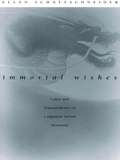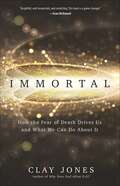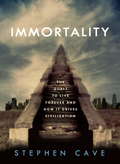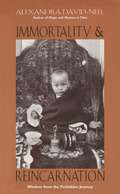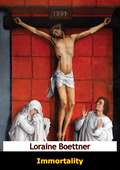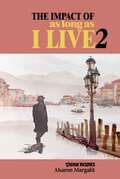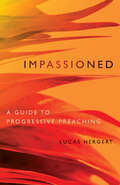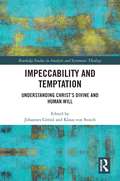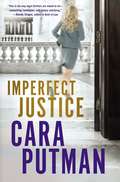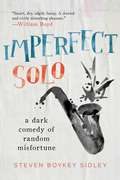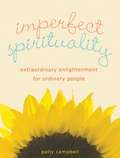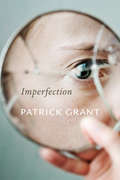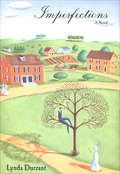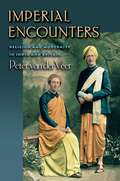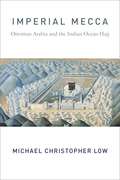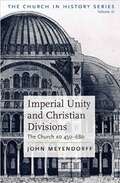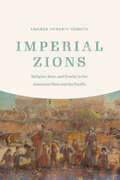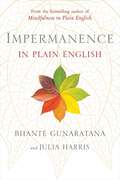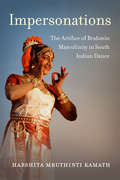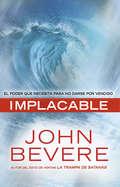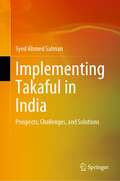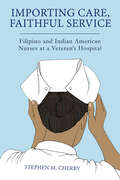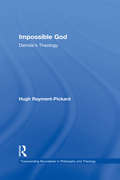- Table View
- List View
Immortal Wishes: Labor and Transcendence on a Japanese Sacred Mountain
by Ellen SchattschneiderImmortal Wishes is a powerful ethnographic rendering of religious experiences of landscape, healing, and self-fashioning on a northern Japanese sacred mountain. Working at the intersection of anthropology, religion, and Japan studies, Ellen Schattschneider focuses on Akakura Mountain Shrine, a popular Shinto institution founded by a rural woman in the 1920s. For decades, local spirit mediums and worshipers, predominantly women, have undertaken extended periods of shugyo (ascetic discipline) within the shrine and on the mountain's slopes. Schattschneider argues that their elaborate, transforming repertoire of ritual practice and ascetic discipline has been generated by complex social and historical tensions largely emerging out of the uneasy status of the surrounding area within the modern nation's industrial and postindustrial economies.Schattschneider shows how, through dedicated work at the shrine including demanding ascents up the sacred mountain, the worshipers come to associate the rugged mountain landscape with their personal biographies, the life histories of certain exemplary predecessors and ancestors, and the collective biography of the extended congregation. She contends that this body of ritual practice presents worshipers with fields of imaginative possibilities through which they may dramatize or reflect upon the nature of their relations with loved ones, ancestors, and divinities. In some cases, worshipers significantly redress traumas in their own lives or in those of their families. In other instances, these ritualized processes lead to deepening crises of the self, the accelerated fragmentation of local households, and apprehension of possession by demons or ancestral forces. Immortal Wishes reveals how these varied practices and outcomes have over time been incorporated into the changing organization of ritual, space, and time on the mountainscape.For more information about this book and to read an excerpt, please click here.
Immortality
by Stephen CaveA fascinating work of popular philosophy and history that both enlightens and entertains, Stephen Cave's Immortality investigates whether it just might be possible to live forever and whether we should want to. But it also makes a powerful argument, which is that it's our very preoccupation with defying mortality that drives civilization. Central to this book is the metaphor of a mountaintop where one can find the Immortals. Since the dawn of humanity, everyone - whether they know it or not - has been trying to climb that mountain. But there are only four paths up its treacherous slope, and there have only ever been four paths. Throughout history, people have wagered everything on their choice of the correct path, and fought wars against those who've chosen differently. While Immortality takes the reader on an eye-opening journey from the beginnings of civilization to the present day, the structure is not chronological. Rather it is path driven. As each path is revealed to us, an historical figure serves as our guide. In drawing back the curtain on what compels humans to "keep on keeping on," Cave engages the reader in a number of mind-bending thought experiments. He teases out the implications of each immortality gambit, asking, for example, how long a person would live if they did manage to acquire a perfectly disease-free body. Or what would happen if a super-being tried to round up the atomic constituents of all who've died in order to resurrect them. Or what our loved ones would really be doing in heaven if it does exist. Or what part of us actually lives in a work of art, and how long that work of art can survive. Toward the the book's end, we're confronted with a series of brain-rattling questions: What would happen if tomorrow humanity discovered that there is no life but this one? Would people continue to care about their favorite sports team, please their boss, vie for the title of Year's Best Salesman? Would three-hundred-year projects still get started? If the four paths up the Mount of the Immortals lead nowhere -- if there is no getting up to the summit -- is there still reason to live? And can civilization survive? Immortality is a deeply satisfying book, as optimistic about the human condition as it is insightful about the true arc of history.
Immortality and Reincarnation: Wisdom from the Forbidden Journey
by Alexandra David-NeelFamed traveler and mystic Alexandra David-Neel, the first Western woman to see the forbidden city of Lhasa, Tibet, examines Eastern concepts of the afterlife in this classic study. The question of what occurs to the individual personality after death is fundamental to the human experience. In Immortality and Reincarnation Alexandra David-Neel, the first Western woman to see the forbidden city of Lhasa, Tibet, examines Taoist, Tibetan, and Hindu concepts concerning life after death. Contrary to Western belief, which sees the human being as composed of a mortal body and an immortal soul, many Easterners believe in the immortality of both the body and the soul. Alexandra David-Neel gained firsthand knowledge of these beliefs and the practices they engendered in the course of her travels at the beginning of this century. In Immortality and Reincarnation she ties them together for a unique look at reincarnation and eternal life in a region untouched by the modern world.
Immortality: Immortality
by Loraine BoettnerIn this concise, comprehensive, and hope-filled study of death and immortality, which was first published in 1956, author Loraine Boettner addresses a wide range of existential questions, including what happens at death, prayers for the dead, burial versus cremation, soul sleep, annihilation, purgatory, and eternal life.“...an enriching, wholesome and comforting book.”—The Evangelical Christian“It is doubtful if any monograph on this subject has ever been published that treats it in a more convincing and challenging manner.”—The Southern Presbyterian Journal“...well written, carefully documented, Scripturally sound, logically presented, and most helpful.”—Sunday School Board, Southern Baptist Convention
Impact Player: Leaving a Lasting Legacy on and off the Field
by David Thomas Bobby Richardson Joe GirardiFormer Yankee Bobby Richardson played alongside Mickey Mantle, Roger Maris, Whitey Ford, Joe Pepitone, and Yogi Berra and he remains the only player from the "losing" team ever to be named World Series MVP. He shares his life story, including never-before-told tales from the clubhouse.
Impact of as Long as I Live
by Aharon MagolitThe fifteen protagonists in this book are fifteen incredible people who internalized that no matter the situation HaKadosh Baruch Hu places us in, we are obligated to bow our heads and accept it: This is the situation. The Borei Olam has placed me here. These are the waves of my personal sea. <p><p> Then we can pick up our heads and look around for what it is we can do. <p><p> Proactive thinking, taking personal responsibility, the awareness that one always has free will-help one make decisions with his mind rather than his emotions. They remind him that every lemon can be made into lemonade, all change can be a springboard for growth and renewal. Most of all, they help one remain levelheaded enough to do whatever he can within the parameters of his current circumstances. <p><p> In this book, you will find your story, the one that speaks to you, the one that touches you, the one that will help you make the right choices in life. <p><p> The bestselling The Impact of As Long as I Live garnered passionate praise and enthusiastic responses from all over the world, indicating that it is not just another book. It is a life story that held a mirror into the life of every Jew, guiding and inspiring him to utilize his kochos and abilities.
Impassioned: A Guide to Progressive Preaching
by Lucas HergertAn engaging and timely guide to preaching with passion from minister and professor Lucas Hergert. Done well, preaching engages mind and heart, soul and body. Passionate preaching offers more than discussion about topics held at a distance; it claims a stake in them. This is especially true right now, as progressive preachers must address today’s social issues with power and conviction. But how does a preacher ensure the congregation not only receives but also feels the message? In Impassioned, minister and professor Lucas Hergert provides practical and detailed advice on how to craft and deliver passionate sermons, including changing the way one selects topics, structuring the sermon, understanding the centrality of emotion, and attending to embodiment and delivery. Hergert draws on resources that are religious and secular, artistic and dramatic, psychological and philosophical, to offer a range of techniques and inspiration to help each preacher find their path forward. And while Impassioned will be a powerful resource for working clergy, busy seminary students, and interested lay leaders, it also provides seasoned preachers with a different angle on the craft. Rethinking the sermon in this way will help preachers offer a heartfelt word as they work to create change in the lives of their community members and their broader social context. Hergert shows exactly how progressives can—and why they should—preach with feeling and force.
Impeccability and Temptation: Understanding Christ’s Divine and Human Will (Routledge Studies in Analytic and Systematic Theology)
by Klaus Von Stosch Johannes GrösslIn Christian theology, the teaching that Christ possessed both a human and divine will is central to the doctrine of two natures, but it also represents a logical paradox, raising questions about how a person can be both impeccable and subject to temptation. This volume explores these questions through an analytic theology approach, bringing together 15 original articles that explore the implications of a strong libertarian concept of free will for Christology. With perspectives from systematic theologians, philosophers, and biblical scholars, several chapters also offer a comparative theology approach, examining the concept of impeccability in the Muslim tradition. Therefore, this volume will be of interest to scholars and graduate students working in analytic theology, biblical scholarship, systematic theology, and Christian-Islamic dialogue.
Imperfect Justice
by Cara C. Putman“This is the way legal thrillers are meant to be—compelling, intelligent, and deeply satisfying.” —Randy Singer, author of Rule of LawTHE POLICE SAY THE WOMAN WAS A MURDERER. EMILIE WESLEY KNOWS THEY CAN’T BE TALKING ABOUT HER CLIENT . . . CAN THEY?To the world it seems obvious: Kaylene Adams killed her daughter and then was shot by police. Attorney Emilie Wesley knows a different story: Kaylene would never hurt anyone and was looking for a way out of a controlling, abusive relationship. Her death shakes Emilie’s belief that she can make a difference for women in violent marriages. Self-doubt plagues her as she struggles to continue her work in the wake of the tragedy.Reid Billings thought he knew his sister—right up until he learned how she died. He discovers a letter from Kaylene begging him to fight for custody of her daughters if anything should happen to her. No attorney in her right mind would support an uncle instead of the father in a custody case, but Kaylene’s letter claims Emilie Wesley will help him.Thrown together in a race to save Kaylene’s surviving daughter, Emily and Reid pursue the constantly evasive truth. If they can hang on to hope together, can they save a young girl—and find a future for themselves in the process?
Imperfect Solo: A Dark Comedy of Random Misfortune
by Steven Boykey SidleyFor Readers of Jonathan Tropper and Philip Roth, the Darkly Comic, Poignant Story of a Man Caught Between the Aspirations of Youth and the Realities of Middle Age—Called “A Perfect Riff on What It Means to Be Human in This Unsettled Age” (Renée Montagne, NPR) Meyer is filled with dread. His fading musical aspirations, his tyrannical CEO, his ex-wives, his exiting girlfriend, his elderly father, his beloved and troublesome children, and his confused and bewildered life all attest to his conviction that the sky will soon fall on his head. And then it does. This is the story of a man adrift in anxiety, ill fortune, and comic mishap, buffeted by the existential and prosaic concerns that modern life in Los Angeles inflicts. Forty years old, caught in the netherworld between the reckless optimism of youth and the resignation of age, Meyer tries to find handrails and ballast. Funny, intellectually probing, and poignant, Imperfect Solo follows the flailing and hapless Meyer as he seeks hope and redemption while his world unravels around him. Surrounded by the absurdities of a fading America, the affection of flawed but well-meaning friends and family, and the randomness of everyday life, he tries gamely to stay afloat. He must navigate love lost and found and lost again, the indignities of aging, the courage to stand up to assholes, and the search for the perfect sax solo. Will Meyer find grace? Can he, or we, ever?
Imperfect Spirituality
by Polly CampbellPulling a raisin out of a two-year-old's nose probably wasn't on Buddha's path toward enlightenment, but it was one of the obstacles for author Polly Campbell. For many, stuck raisins and other real-life moments provide sometimes the only opportunity for spiritual growth in a day. Imperfect Spiritualityshows readers how to integrate those every-day moments with traditional spiritual techniques to experience personal growth and greater well-being all in the course of your regular routine. Any activity can be transformed into a spiritual practice. Don't have a half-hour to meditate? Can't drop everything ala Elizabeth Gilbert and trek to Italy or India? Do a mini-meditation while stopped at a red light. Working to be mindful and present? Start by brushing your teeth.Imperfect Spirituality is filled with practical tips and dozens of examples like these, as well as anecdotes from real people who are striving to grow both spiritually and personally. Each chapter features fascinating research about how the mind body spirit connection really works as well as illuminating ,quotes, and informative, easy-to-do takeaways from leading-edge academic and spiritual experts who both study and practice the techniques explored in the book. Popular blogger and workshopper Polly Campbel, a favorite journalist for Daily Om and Psychology Today, emerges here as a fresh and important new voice in spirituality who offers a path to enlightenment for "the rest of us."
Imperfect Spirituality: Extraordinary Enlightenment for Ordinary People
by Polly CampbellPulling a raisin out of a two-year-old's nose probably wasn't on Buddha's path toward enlightenment, but it was one of the obstacles for author Polly Campbell. For many, stuck raisins and other real-life moments provide sometimes the only opportunity for spiritual growth in a day. Imperfect Spiritualityshows readers how to integrate those every-day moments with traditional spiritual techniques to experience personal growth and greater well-being all in the course of your regular routine. Any activity can be transformed into a spiritual practice. Don't have a half-hour to meditate? Can't drop everything ala Elizabeth Gilbert and trek to Italy or India? Do a mini-meditation while stopped at a red light. Working to be mindful and present? Start by brushing your teeth. Imperfect Spirituality is filled with practical tips and dozens of examples like these, as well as anecdotes from real people who are striving to grow both spiritually and personally. Each chapter features fascinating research about how the mind body spirit connection really works as well as illuminating ,quotes, and informative, easy-to-do takeaways from leading-edge academic and spiritual experts who both study and practice the techniques explored in the book. Popular blogger and workshopper Polly Campbel, a favorite journalist for Daily Om and Psychology Today, emerges here as a fresh and important new voice in spirituality who offers a path to enlightenment for "the rest of us."
Imperfection
by Patrick Grant“…aspirations to perfection awaken us to our actual imperfection.” It is in the space between these aspirations and our inability to achieve them that Grant reflects upon imperfection. Grant argues that an awareness of imperfection, defined as both suffering and the need for justice, drive us to an unrelenting search for perfection, freedom, and self-determination. The twenty-one brief chapters of Imperfection develop this governing idea as it relates to the present situation of the God debate, modern ethnic conflicts, and the pursuit of freedom in relation to the uncertainties of personal identity and the quest for self-determination. Known for his exploration of the relationship between Buddhism and violent ethnic conflict in modern Sri Lanka, as well as his contribution to the study of Northern Ireland and the complex relationships among religion, literature, and ethnicity, Grant provides the reader with an analysis of the widespread rise of religious extremism across the globe. Referencing Plato, Van Gogh, Jesus, and the Buddha, he enlightens the reader with both succinct and original insights into human society. Imperfection is the result of an important Canadian public intellectual at work.
Imperfections: A Novel
by Lynda DurrantAs the Civil War looms, a teenager finds refuge from her abusive father in a Shaker community in this &“lovely and thought-provoking&” novel (Kirkus Reviews). Rosemary Elizabeth likes Pleasant Hill. Unlike her former home, the Kentucky Shaker community is serene and full of beautiful things. The food is plentiful and delicious, and she dresses in spotless white garments. Above all, she and her younger siblings are now safe from their drunken, often violent, father, and from the war between the Union and the Confederacy, which is said to be drawing closer every day. Perfection is the goal at Pleasant Hill, and Rosemary Elizabeth vows to be perfect so she&’ll be allowed to stay. As time passes, however, she finds herself more and more at odds with the Shaker path, the rules that are supposed to govern everything she says and does and even what she dreams. If she eliminates all the imperfections the Shakers find in her, will anything remain? &“Built around a historical incident—a visit by the soldiers of Morgan&’s Raiders to Pleasant Hill in 1862—this fine coming-of-age novel rewards readers with an unusual glimpse into a rarely portrayed religion as well as a different perspective on the Civil War.&” —Booklist
Imperial Encounters: Religion and Modernity in India and Britain
by Peter van der VeerPicking up on Edward Said's claim that the historical experience of empire is common to both the colonizer and the colonized, Peter van der Veer takes the case of religion to examine the mutual impact of Britain's colonization of India on Indian and British culture. He shows that national culture in both India and Britain developed in relation to their shared colonial experience and that notions of religion and secularity were crucial in imagining the modern nation in both countries. In the process, van der Veer chronicles how these notions developed in the second half of the nineteenth century in relation to gender, race, language, spirituality, and science. Avoiding the pitfalls of both world systems theory and national historiography, this book problematizes oppositions between modern and traditional, secular and religious, progressive and reactionary. It shows that what often are assumed to be opposites are, in fact, profoundly entangled. In doing so, it upsets the convenient fiction that India is the land of eternal religion, existing outside of history, while Britain is the epitome of modern secularity and an agent of history. Van der Veer also accounts for the continuing role of religion in British culture and the strong part religion has played in the development of Indian civil society. This masterly work of scholarship brings into view the effects of the very close encounter between India and Britain--an intimate encounter that defined the character of both nations.
Imperial Mecca: Ottoman Arabia and the Indian Ocean Hajj (Columbia Studies in International and Global History)
by Michael Christopher LowWith the advent of the steamship, repeated outbreaks of cholera marked oceanic pilgrimages to Mecca as a dangerous form of travel and a vehicle for the globalization of epidemic diseases. European, especially British Indian, officials also feared that lengthy sojourns in Arabia might expose their Muslim subjects to radicalizing influences from anticolonial dissidents and pan-Islamic activists. European colonial empires’ newfound ability to set the terms of hajj travel not only affected the lives of millions of pilgrims but also dramatically challenged the Ottoman Empire, the world’s only remaining Muslim imperial power.Michael Christopher Low analyzes the late Ottoman hajj and Hijaz region as transimperial spaces, reshaped by the competing forces of Istanbul’s project of frontier modernization and the extraterritorial reach of British India’s steamship empire in the Indian Ocean and Red Sea. Imperial Mecca recasts Ottoman Arabia as a distant, unstable semiautonomous frontier that Istanbul struggled to modernize and defend against the onslaught of colonial steamship mobility. As it turned out, steamships carried not just pilgrims, passports, and microbes, but the specter of legal imperialism and colonial intervention. Over the course of roughly a half century from the 1850s through World War I, British India’s fear of the hajj as a vector of anticolonial subversion gradually gave way to an increasingly sophisticated administrative, legal, and medical protectorate over the steamship hajj, threatening to eclipse the Ottoman state and Caliphate’s prized legitimizing claim as protector of Islam’s most holy places. Drawing on a wide range of Ottoman and British archival sources, this book sheds new light on the transimperial and global histories traversed along the pilgrimage to Mecca.
Imperial Unity and Christian Divisions: The Church 450-680 AD (Church History)
by John MeyendorffAlmost without exception, the "histories of the Church" available in print are, in fact, histories of Western Christianity, with only brief and superficial mentions of the East. This volume, the second in a planned series of six, attempts to achieve a more balanced approach. Filling the needs of students, but also of a wider readership, it describes the expansion of Christianity in the East and the West in the fifth, sixth, and seventh centuries - from Ireland and the Indian Ocean and from Germany to Nubia. It exposes the tensions which arose between the inevitable cultural pluralism and the needs of Church unity, an issue which stands at the center of modern ecclesiological concerns. It discusses the debates on the identity of Christ, formally solved by the decrees of the great ecumenical councils, but which left Christendom divided. It defines the problems raised by the arbitrariness of Eastern Roman emperors and by the gradual development of Roman primacy.
Imperial Zions: Religion, Race, and Family in the American West and the Pacific (Studies in Pacific Worlds)
by Amanda Hendrix-KomotoIn the nineteenth century, white Americans contrasted the perceived purity of white, middle-class women with the perceived eroticism of women of color and the working classes. The Latter-day Saint practice of polygamy challenged this separation, encouraging white women to participate in an institution that many people associated with the streets of Calcutta or Turkish palaces. At the same time, Latter-day Saints participated in American settler colonialism. After their expulsion from Ohio, Missouri, and Illinois, Latter-day Saints dispossessed Ute and Shoshone communities in an attempt to build their American Zion. Their missionary work abroad also helped to solidify American influence in the Pacific Islands as the church became a participant in American expansion.Imperial Zions explores the importance of the body in Latter-day Saint theology with the faith&’s attempts to spread its gospel as a &“civilizing&” force in the American West and the Pacific. By highlighting the intertwining of Latter-day Saint theology and American ideas about race, sexuality, and the nature of colonialism, Imperial Zions argues that Latter-day Saints created their understandings of polygamy at the same time they tried to change the domestic practices of Native Americans and other Indigenous peoples. Amanda Hendrix-Komoto tracks the work of missionaries as they moved through different imperial spaces to analyze the experiences of the American Indians and Native Hawaiians who became a part of white Latter-day Saint families. Imperial Zions is a foundational contribution that places Latter-day Saint discourses about race and peoplehood in the context of its ideas about sexuality, gender, and the family.
Impermanence in Plain English
by Bhante Gunaratana Julia HarrisThe bestselling author of Mindfulness in Plain English guides the reader toward a direct and personal realization of one of the foundational tenets of Buddhism: all things that arise must pass away.In Impermanence in Plain English, the beloved author and teacher Bhante Gunaratana, alongside Julia Harris, clearly and masterfully explains the key Buddhist insight of impermanence and invites the reader to personally investigate its truth. Once-youthful bodies grow old and weary. New thoughts, feelings, and sensations arise and fade every second. Impermanence is not some abstract, metaphysical idea. This is the Dhamma, and you can see it for yourself. Drawing from Pali scriptures and writing with fresh, direct language, Bhante Gunaratana and Julia Harris highlight the Buddha&’s exhortation that we must directly realize for ourselves the liberating insights that free us from suffering and cyclic existence, without relying only on the word of religious authorities or academic or philosophical musings.
Impersonations: The Artifice of Brahmin Masculinity in South Indian Dance
by Harshita Mruthinti KamathLearn more at www.luminosoa.org.Impersonations: The Artifice of Brahmin Masculinity in South Indian Dance centers on an insular community of Smarta Brahmin men from the Kuchipudi village in Telugu-speaking South India who are required to don stri-vesam (woman’s guise) and impersonate female characters from Hindu religious narratives. Impersonation is not simply a gender performance circumscribed to the Kuchipudi stage, but a practice of power that enables the construction of hegemonic Brahmin masculinity in everyday village life. However, the power of the Brahmin male body in stri-vesam is highly contingent, particularly on account of the expansion of Kuchipudi in the latter half of the twentieth century from a localized village performance to a transnational Indian dance form. This book analyzes the practice of impersonation across a series of boundaries—village to urban, Brahmin to non-Brahmin, hegemonic to non-normative—to explore the artifice of Brahmin masculinity in contemporary South Indian dance.
Implacable: El poder que necesita para no darse por vencido
by John Bevere¡Usted ya tiene lo que necesita para finalizar bien!La idea nunca fue que los cristianos meramente vivieran. Usted fue creado para sobresalir ante cualquier adversidad y para demostrar grandeza. En este imprescindible libro, el autor de éxitos de ventas John Bevere explora todo lo necesario para terminar bien. Más que una estrategia para sobrevivir, Implacable presenta una nueva forma de pensar, una que con entusiasmo declara como el apóstol Pablo: &“Me gozo en las debilidades&”. Su sólida base bíblica le ayudará a florecer en cada temporada de la vida.
Implementing Takaful in India: Prospects, Challenges, and Solutions
by Syed Ahmed SalmanThis book encourages insurance companies and regulators to explore offering Islamic insurance to boost the insurance industry in India. The distinctive features of Takaful also make it appealing even to non-Muslims. According to the 2012 World Takaful Report, India has immense potential for Takaful is based on the size of its Muslim population and the growth of its economy. However, it is surprising that Takaful has yet to be introduced in India since it has been offered in non-majority Muslim countries, such as Singapore, Thailand, and Sri Lanka. When the concept and practice of Takaful are examined, it is free from interest, uncertainty, and gambling. These are the main elements prohibited in Islam. However, it has been evidenced that these elements are also banned in teaching other religions believed by the Indians. Given this landscape, this book fills the gap in research on the viability of Takaful in India, focusing on its empirical aspects by examining the perception of Indian insurance operators toward Takaful.
Importing Care, Faithful Service: Filipino and Indian American Nurses at a Veterans Hospital (Critical Issues in Health and Medicine)
by Stephen M. CherryEvery year thousands of foreign-born Filipino and Indian nurses immigrate to the United States. Despite being well trained and desperately needed, they enter the country at a time, not unlike the past, when the American social and political climate is once again increasingly unwelcoming to them as immigrants. Drawing on rich ethnographic and survey data, collected over a four-year period, this study explores the role Catholicism plays in shaping the professional and community lives of foreign-born Filipino and Indian American nurses in the face of these challenges, while working at a Veterans hospital. Their stories provide unique insights into the often-unseen roles race, religion and gender play in the daily lives of new immigrants employed in American healthcare. In many ways, these nurses find themselves foreign in more ways than just their nativity. Seeing nursing as a religious calling, they care for their patients, both at the hospital and in the wider community, with a sense of divine purpose but must also confront the cultural tensions and disconnects between how they were raised and trained in another country and the legal separation of church and state. How they cope with and engage these tensions and disconnects plays an important role in not only shaping how they see themselves as Catholic nurses but their place in the new American story.
Impossible God: Derrida's Theology (Transcending Boundaries in Philosophy and Theology)
by Hugh Rayment-PickardImpossible God introduces Derrida's theology for a new generation interested in Derrida's writings and in the future of theology, and clarifies Derrida's theology for those already familiar with his writings. Derrida's theological concerns are now widely recognised but Impossible God shows how Derrida's theology takes its shape from his earliest writings on Edmund Husserl and from explorations into Husserl's unpublished manuscripts on time and theology. Rayment-Pickard argues that Derrida goes beyond both the nihilism of the 'death of God' and the denials of negative theology to affirm a theology of God's 'impossibility'. Derrida's 'impossible God' is not another God of the philosophers but a powerful deity capable of wakening us into faith, ethical responsibility and love. Showing how central theology has been to Derrida's philosophy since the beginning of his career, Impossible God presents an accessible study of a neglected area of Derrida's writing which students of philosophy and theology will find invaluable.
